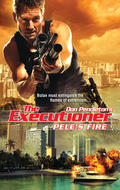Das Buch kann nicht als Datei heruntergeladen werden, kann aber in unserer App oder online auf der Website gelesen werden.
Buch lesen: "Loose Cannon"
The Executioner abandoned the trail
He tucked the carbine in close to his chest as he zigzagged down the uneven slope. The going was precarious as the ground beneath him was clotted with loose stones and small rocks. For each sure step there would be one where the ground gave way under his weight. Several times he dropped to one knee, raising welts along his thigh as he half fell, half slid his way downhill, raising a cloud of volcanic ash and dislodging the gravel around him. It was as if he’d become a one-man avalanche.
After another twenty yards, the ground abruptly fell away and he was thrown forward, off balance, into a deep recess. He struck the far edge of the gully knee-first, then with his shoulder, jarring his carbine loose. The rifle sailed past him and rolled sideways another five yards before coming to a rest. Bolan, meanwhile, slumped into the cavity, dazed. He had the presence of mind to drop as low as he could, avoiding the stream of gunfire that, moments later, skimmed past the gully’s rim. As he waited for his head to clear, the Executioner reached for his web holster, unsheathing his Beretta.
He was down but not out.
Loose Cannon
The Executioner®
Don Pendleton

Special thanks and acknowledgment to Ron Renauld for his contribution to this work.
The responsibility of the great states is to serve and not to dominate the world.
—Harry S. Truman,
1884–1972
When a man who holds power tries to dominate others for his own benefit, it is my responsibility to stop him.
—Mack Bolan
THE MACK BOLAN LEGEND
Nothing less than a war could have fashioned the destiny of the man called Mack Bolan. Bolan earned the Executioner title in the jungle hell of Vietnam.
But this soldier also wore another name—Sergeant Mercy. He was so tagged because of the compassion he showed to wounded comrades-in-arms and Vietnamese civilians.
Mack Bolan’s second tour of duty ended prematurely when he was given emergency leave to return home and bury his family, victims of the Mob. Then he declared a one-man war against the Mafia.
He confronted the Families head-on from coast to coast, and soon a hope of victory began to appear. But Bolan had broken society’s every rule. That same society started gunning for this elusive warrior—to no avail.
So Bolan was offered amnesty to work within the system against terrorism. This time, as an employee of Uncle Sam, Bolan became Colonel John Phoenix. With a command center at Stony Man Farm in Virginia, he and his new allies—Able Team and Phoenix Force—waged relentless war on a new adversary: the KGB.
But when his one true love, April Rose, died at the hands of the Soviet terror machine, Bolan severed all ties with Establishment authority.
Now, after a lengthy lone-wolf struggle and much soul-searching, the Executioner has agreed to enter an “arm’s-length” alliance with his government once more, reserving the right to pursue personal missions in his Everlasting War.
Contents
Chapter 1
Chapter 2
Chapter 3
Chapter 4
Chapter 5
Chapter 6
Chapter 7
Chapter 8
Chapter 9
Chapter 10
Chapter 11
Chapter 12
Chapter 13
Chapter 14
Chapter 15
Chapter 16
Chapter 17
Chapter 18
Chapter 19
Chapter 20
Chapter 21
Chapter 22
Chapter 23
1
Stony Man Farm, Virginia
Mack Bolan liked to start his day, whenever possible, by stretching and then going for a short jog. The routine loosened him up, eased the aches incurred from combat on a thousand battlefields and helped clear his mind so that he would feel energized and focused for whatever demands the day would bring. Of course, given the extent to which he found himself out in the field—under the gun with his life on the line—moments like this morning were more the exception than the rule. It had been weeks, in fact, since there’d been time for the Executioner to indulge in his favored regimen. So, as he loped along the inner perimeter of Stony Man Farm, breath clouding in the cool morning air, Bolan savored the moment.
He was out on the east edge of the property, where evenly spaced rows of timber trees blocked his view of the chipping mill that served as a front for the Farm’s covert Annex facilities. Mottled sunlight filtered through the bird-filled poplars and a slight breeze carried with it the faint, cloying scent of fresh peaches and strawberries. Save for an occasional glimpse of the perimeter fence off to his right, Bolan had the sense of being out in the middle of nowhere, reprieved, for the moment, from his tireless commitment to stand hard and tall against those dark elements forever intent on heaving the world into a maelstrom.
As he neared the edge of the tree line, the steady, rhythmic thump of Bolan’s jogging shoes on the dirt path was echoed by a similar, albeit mechanical, drone from overhead. As the sound drew closer, Bolan recognized the telltale rotor hum of the Farm’s shuttle chopper. The Bell 206 was coming in from the east, a sure sign given the hour that Sensitive Operations Group Director Hal Brognola was on board, heading back from a presidential briefing in Washington. Bolan knew it was equally likely that Brognola had left the White House with news that some fresh hell had broken out at one of the world’s hotspots, requiring the input of Stony Man’s covert operatives to ensure that U.S. interests were not imperiled by the recent turn of events. Duty called, and with solemn intent, the Executioner cut short his morning run and changed course.
Barbara Price, Stony Man’s mission controller, had emerged from the tri-level main house where she resided when not conducting business at the nearby Annex facilities. Tall, blond-haired and casually dressed in jeans and a lightweight sweater, Price had the look and bearing of a woman who knew her own mind and brooked little nonsense from anyone who might mistake her ready smile for a sign of weakness. She flashed that smile at Bolan as he approached her. He returned an equally disarming grin. The look between them spoke of shared intimacy, and though neither of them had ever so much as entertained a matrimonial notion, they acknowledged each other as soul mates, and Bolan had spent the night in Price’s arms before setting out on his morning run.
Bolan gestured at the chopper, then asked Price, “Where’s the fire this time?”
“LET ME RUN this back to make sure I’ve got it all right,” Bolan said a half hour later as he sat with Brognola and Price in the Annex computer room. Brognola’s face was taut with an expression of quiet intensity. Also in the room was Aaron “the Bear” Kurtzman, a burly man whose confinement to a wheelchair did little to sap a look of vitality that was only partially enhanced by his steady consumption of what others at the Farm kindly referred to as the World’s Most Mediocre Coffee.
“You never get it wrong,” Kurtzman told Bolan, “but this one’s so convoluted a quick rehash might do us all some good.”
“All right, then,” Bolan said. “Two days ago in Indonesia, UNESCO found a party of seven men shot to death in a gorge in a nature preserve in Aceh Province. Less than a mile away, they came across more bodies near a Jeep that looked like it went off a mountain road after crashing into some fallen trees. They think at least a couple more men were dragged off by crocodiles.”
“So far, so good,” Brognola said.
“The men found in the gorge were killed by weapons found on the men who died in the Jeep crash,” Bolan went on, “so the theory is the second group died while fleeing the scene of the ambush.”
“And the men in the gorge were unarmed,” Price added, making certain she’d pieced it all together correctly herself. “They were supposedly on a field trip trying to gauge the toll poaching had taken on the preserve’s endangered species.”
“Correct,” Brognola said. “They were with Gerakan Aceh Merdeka.”
“The Free Aceh Movement,” Bolan interjected. “And the men in the Jeep were with the Ministry of the Interior. Government agents.”
“The head of the ministry is running against GAM for reelection as governor of Aceh Province,” Price said. She turned to Brognola. “I’m sorry, I don’t remember his name.”
“Noordin Zailik,” Brognola said. “He’s denying that the ministry agents had anything to do with ambushing the GAM people. Of course, GAM is pointing to the evidence and trying to milk the situation for all it’s worth, since their guy is running neck-and-neck with Zailik in the polls.”
“And their guy is Anhi Hasbrok,” Bolan said. “Former head of GAM’s military arm.”
Kurtzman grinned at Brognola. “What’d I tell you? You run something by Striker, it’s like programming it into a damn computer.”
“The governor has ordered a full-scale investigation, down to going after crocodiles with tranquilizer darts on the chance they can be x-rayed for any trace of the missing G-men,” the big Fed said.
“Good luck with that,” Kurtzman replied.
“It’s apt to be a drawn-out process,” Brognola admitted. “Meanwhile, both Zailik and Hasbrok are cranking up the rhetoric to the point where Washington is worried about the area’s political stability. And not just because of GAM’s track record for resorting to violence.”
“They’re worried about JI moving in,” Bolan guessed.
“Exactly,” Brognola said. “Jemaah Islamiyah have been taking it on the chin lately thanks to the antiterrorist squad Densus 88, but they’re not about to roll over. According to our intel, JI are replacing their cells as fast as they get knocked down, and they’re hoarding whatever arms they can get off the black market. Word is they’re stirring up most of the clamor in East Timor, and if they figure the time is right in Aceh, odds are they’d be quick to make a move there.”
“They’re backing some cleric who’s running against Zailik and Hasbrok, too, right?” Kurtzman asked.
“Yes,” Brognola replied, “but the guy’s running a distant third. The latest polls had him at less than ten percent.”
“He could wind up playing spoiler, though,” Kurtzman said.
“I suppose so.”
Bolan weighed the implications, then voiced his thoughts. “Any chance JI had a hand in the ambush?”
“You want to spell it out?” Brognola asked.
“It’s simple,” Bolan said. “If we’re assuming that things aren’t the way they look, then we’re saying somebody drove the ministry agents off the road, made sure they were dead, stole their weapons and used them to ambush the GAM people, then doubled back and left the weapons near the Jeep so it would look like a government hit. To pull off something like that takes a lot of precision.”
“Which JI specialize at,” Price added, completing the thought.
“You could have something there,” Brognola conceded. “But there’s another option we need to look at, too. I wanted to make sure you were clear on what went down before I brought it up, but now that you’re up to speed…”
Bolan nodded. “There’s always a twist.”
“Unfortunately, yes.” Brognola raided his attaché case for a file, which included a compact disc. “Can you cue this up for me, Bear?” he asked, handing it to Kurtzman.
Kurtzman, who oversaw the Farm’s cybernetic crew, wheeled to his computer station. In seconds, he’d opened the CD’s files and transferred its data onto his hard drive.
“Done,” he told Brognola. “What do you want to look at first?”
“The photo file,” Brognola replied.
“Coming up.”
Kurtzman worked his cursor, and moments later the image of a dough-faced middle-aged man with dark hair and a well-groomed goatee filled his screen as well as one of the larger monitors imbedded on the far wall.
“Carl Ryan,” Brognola said, identifying the man on the screen. “Career politico, mostly with the State Department, including a nice, long run as U.S. ambassador to Indonesia.”
“Until he wound up in prison, right?” Price said. “Something to do with skimming reconstruction funds after the tsunami.”
“That’s right,” Brognola confirmed. “He siphoned off nearly two million dollars that’s been accounted for, and they think he helped himself to even more before he got caught with his hand in the cookie jar.”
“I think I can see where this is headed,” Bolan murmured.
“Ryan was paroled last month after serving half his sentence,” Brognola explained. “He wasn’t out more than a week before he disappeared.”
“That would be a euphemism for ‘skipped the country’,” Kurtzman guessed.
“We don’t have any proof yet, but that’s the scenario we’re working with,” Brognola said. “And the thinking is that he’s probably headed back to his old stomping grounds.”
“To get to whatever money he managed to stash,” Price said.
“Again, that’s only speculation, but it would make sense,” Brognola said. “And you have to consider that he’s probably still connected with some key players in the islands. After all, he was ambassador for four years before the wheels came off.”
“Got it,” Bolan said, “but how do we figure he might be mixed up with the ambush?”
“He might not be,” Brognola conceded, “but when you figure he was replaced over there by the guy who blew the whistle on him, it’s fair to say he’d have an interest in seeing all hell break loose and have the new ambassador take the heat for letting things get out of hand.”
“That’d be going to a lot of trouble for not much in the way of payback,” Bolan said.
Brognola nodded, adding, “Or maybe the ambush is just the beginning.”
2
Banda Aceh, Indonesia
“Of course we had nothing to do with it!” Noordin Zailik snapped into his speakerphone. The provincial governor, an obese man in his late fifties with dyed black hair, leaned forward in his chair and slammed his fist hard on a large oak desk where the phone rested alongside a stack of paperwork and a few objets d’art accumulated during his term in office. “The ministry agents were there because poachers had been reported in the area. For no other reason!”
“What was that noise?” a man with a calm, sonorous voice asked over the phone’s speaker. Ambassador Robert Gardner was on the line from the U.S. embassy in Jakarta.
“This noise?” Zailik bellowed, thumping the desk a second time. “It’s me cracking heads trying to find out who was behind those killings! I’m being framed and you know it!”
“I’m looking over the intel,” Gardner responded, his voice taking on the tone of a school teacher whose patience was being tested by a problem student, “and I have to say, all the evidence seems to point to—”
“I don’t care where the evidence points!” Zailik interrupted. “Do you really think I’d be so stupid as to place a hit on some low-level GAM lackeys? You think I don’t know how something like that would backfire on me at the polls?”
The governor glared at the speakerphone, waiting for an answer. He could imagine Gardner smirking back in his office, taking pleasure in riling him. It’d been like this from the moment Gardner had taken over as ambassador. Always so smug and condescending, just like his predecessor.
Zailik was still waiting for Gardner to respond when his personal secretary appeared in the doorway, holding a clipboard, an urgent expression on her face. The governor signaled for her to wait a moment, then leaned toward the speakerphone.
“I have an important meeting to get to,” he told Gardner coldly. “Think what you want, but I’m telling you I had no hand in this and when I prove it I’ll be expecting an apology!”
Zailik pressed a button on the phone’s console, abruptly ending the call. He glanced back at his secretary. Ti Vohn was an attractive woman in her early thirties, conservatively dressed with her dark hair pulled back from the high cheekbones that adorned her oval face. Zailik’s wife had raised a fuss when he’d hired the woman, but he’d refused to let her go. There were days, like this, when he wished his wife’s jealousy had some foundation.
“What is it, Ti?” he asked, trying his best to offer the woman an inviting smile. “Good news, I hope.”
“I’m sorry, sir,” Vohn responded.
Zailik slumped in his chair as the woman explained that investigators combing the rain-soaked Gunung Leuser ambush sites had yet to find any evidence to refute the prevalent theory that Interior Ministry agents had carried out the GAM killings before dying when their Jeep had subsequently gone off the road as they were leaving the scene. The placement of logs across the mountain road seemed to be the work of illegal loggers who had been attempting to slide fallen trees down to the river for transport away from the park. It appeared merely coincidental that the ministry troops had crashed into the inadvertent barricade before the loggers could move the trees off the road. The investigators were still looking for the loggers but suspected they had fled the area once they realized what had happened. The rain had washed away any tracks that might have provided clues as to the direction they might have taken.
Preliminary autopsies showed that the victims had died of blunt trauma injuries likely incurred when the Jeep had plummeted into the ravine. And, as Zailik feared, little headway had been made regarding the logistical nightmare of rounding up the area’s population of thousand-pound crocodiles so they could be x-rayed for any trace of those ministry agents still reported missing.
As he absorbed the news, Zailik stared dully out his window. A storm front had long passed, and morning sunlight shimmered on the black domes rising from Baiturrahman Grand Mosque, located a short walk from the governor’s residence in downtown Banda Aceh. Why was Allah testing him like this? Zailik wondered fleetingly. First the tsunami, then having to deal with scandal-plagued reconstruction efforts. And now this. Whatever had happened to the dream of his governorship being a stepping stone to the presidency of all Indonesia? As it was, Zailik knew he’d be lucky to win another term as head of this godforsaken province.
Ti Vohn was eyeing Zailik expectantly when he turned back to her. He told the woman to line up a call so that he could arrange to allocate more manpower to the investigation. Somewhere out in that overgrown wilderness there had to be proof that would vindicate him, and he needed to find it as quickly as possible.
“Before I do that, there’s one more thing,” his secretary told him. There was a tinge of reluctance in her voice.
“More bad news, I trust,” Zailik groused.
“There’s a demonstration at the mosque.”
Zailik shook his head miserably. “Let me guess,” he ventured. “They’re waving placards calling me ‘GAM butcher’.”
“I’m not sure of the wording, but they’re holding you responsible,” the secretary replied. “Word is they plan to march through town to gather more supporters, then continue the demonstration here.”
“And burn me in effigy, no doubt.”
Zailik eyed the clock on the wall next to him. In a couple of hours he was scheduled to fly to Takengon for a fund-raising dinner. In light of events, he’d planned to cancel the appearance, but now the idea of pandering for campaign contributions seemed less burdensome than having to contend with an angry throng of GAM sympathizers.
“Round up the motorcade,” he told his secretary. “I want to leave early for the airport.”
“I’ll make the arrangements,” Vohn responded. Almost as an afterthought, she mentioned, “They’re still doing repairs on the main road, so traffic might be a problem.”
Without hesitation, Zailik responded, “Then we’ll take the back way.”
AS SHE LEFT the governor’s office, Ti Vohn almost felt sorry for Zailik. The man was clearly so obsessed with proving his innocence that he wasn’t thinking straight. Send more men out into the jungle? Chase after crocodiles the size of small dinosaurs hoping to find clues tucked away in their bellies? It all seemed so foolish. Why couldn’t he see that his resources would be put to better use investigating likely suspects instead of going over the same ground again and again? And then there was the matter of moving up his departure time for the airport. It would be one thing if he were merely some business executive looking for his chauffeur to show up an hour earlier. But as governor there were security protocols, and given the logistics and manpower involved, to suddenly create a mad scramble to make certain the motorcade route was properly screened and readied at a moment’s notice, especially under the circumstances, was foolhardy. And taking the back way was an even greater invitation to disaster. Vohn would have pointed out as much, save for the fact that she not only anticipated Zailik’s desire to go to any means to avoid the demonstrators, but she had also been banking on it.
Before returning to her workstation, Vohn detoured into the ladies’ room. She was the only woman working in this side of the building, but she locked the door behind her nonetheless. She retreated to one of the stalls farthest from the outer window. From her dress pocket she took a cheap prepaid cell phone and thumb-punched a memorized number. Someone answered on the seventh ring. She recognized the man’s voice.
“He took the bait,” she whispered. “He’ll be heading for the airport within the hour.”
“And you convinced him to take the back way?”
“He didn’t need much convincing,” Vohn said.
“Excellent,” the other caller responded. “We’ll be ready for him…”
Sulawesi, Indonesia
AGMED HASEM nodded approvingly as the latest group of recruits finished their training drills and fell into line before him. There were sixteen in all, ranging in age from their late teens to a couple, like Hasem, in their early thirties. They’d been worked hard and were all perspiring in the late-morning sun that beat down on the isolated camp, located five miles north of Makassar on the site of a water-treatment plant shut down years earlier when an upgraded facility had been completed closer to the city.
“Well done, praise Allah,” he told them. “Jemaah Islamiyah is blessed to have men of such caliber ready to devote themselves to our noble cause.”
In truth, Hasem was somewhat disappointed in the effort he’d seen. Most of the recruits were clumsy and far more winded from their exertions than he would have liked. But he’d found over the years that it was better to stroke the egos of those looking to join his fold than to play drill sergeant. Fill them with pride, food and constant indoctrination about the glory of martyrdom and there was a better chance they would be ready to lay down their lives on the suicide missions that were Hasem’s preferred modus operandi.
And, too, there was the matter of replenishing the ranks following a month when JI had seen more than a dozen men killed or imprisoned in raids on camps across the Java Sea in Larantuka and Maumere. The raids, carried out by Densus 88 antiterror squads, had, like countless other sweeps over the past five years, been widely publicized in the media, giving the impression that Jemaah Islamiyah was on the ropes and facing eradication. Hasem took issue with the assessment but there was no denying that bad press had taken its toll on recruitment. Gone were the days when JI routinely turned away fringe candidates for the organization. Now, Hasem and other field commanders had been forced to become more solicitous and less discriminating.
Things would change soon, though, Hasem reasoned. Even as he was exhorting the recruits, the charismatic leader knew that JI teams in Banda Aceh were preparing to launch what would be the first in a series of counterstrikes against Densus 88. If all went well, when the dust settled, JI’s reputation would be such that once again they would be able to pick and choose from the swelling ranks of those eager to join the cause. For now, however, Hasem would make do with what he had.
Hasem lectured his minions a few minutes longer, giving the men a well-practiced spiel heavy on references to Allah and laden with vitriol demonizing the United States as the Great Satan. Much was made, too, of the threat posed by secular leaders throughout the islands—men like Governor Zailik of Aceh Province—who took a hardline stance against Islamic fundamentalists. Those local politicians, to Hasem’s way of thinking, were every bit a hindrance to what JI stood for as the Americans and their European counterparts. Indonesia, after all, contained the highest Muslim concentration in the world. What better place for Islam to flourish and lay the groundwork for a long-overdue return to global prominence?
A breeze rustled through the camp, and as the recruits detected the smell of fried rice and roast goat coming from the kitchens set up inside the former treatment plant, Hasem could see the men’s attention beginning to waver. He quickly wrapped up his remarks, then sent the men to eat.
A truck had pulled up to the site, parking near Hasem’s quarters, a rusting Quonset hut set back at the edge of the clearing. Hasem went to check on things, catching up with the driver as he was circling around the truck.
“Did you get it?” he asked.
“See for yourself,” the driver told him. He opened the rear doors of the truck, revealing an oblong wooden crate the size of a small coffin. The lid was unfastened, and when Hasem raised it, he smiled. Laid out in neat rows within the crate where thin slabs of Semtec. Once placed in the lining of snug vests worn beneath loose clothing, the plastic explosives would be difficult to detect to the visible eye. As such, they would be a far better choice for suicide missions than dynamite sticks or the other, bulkier explosive materials JI had been forced to rely on, thanks to Densus 88’s clampdown on the black market.
“Excellent,” Hasem said, placing the lid back on the crate. He told the driver to wait while he went for his payment, then headed toward the nearby hut. He was met in the doorway by one of his lieutenants, Guikin Daeng, a sallow, sneering man in his late twenties.
“I was just coming to track you down,” Daeng told Hasem. “We just received word from our team in Banda Aceh. Governor Zailik is setting out early for the airport, just as we hoped.”
“Our little demonstration scared him out of his cozy little nest?” Hasem asked.
Daeng nodded, then squawked like a chicken and laughed.
“Out of the frying pan,” Hasem intoned. “Into the fire…”
Die kostenlose Leseprobe ist beendet.








